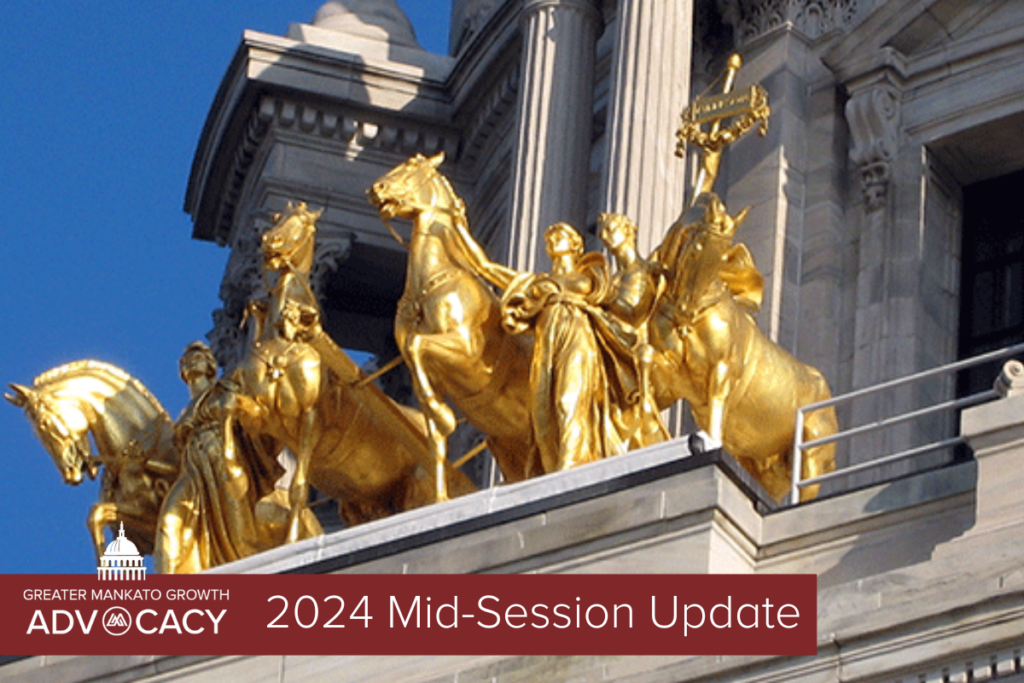The 2024 legislative session has reached the halfway point. The first and second deadlines have passed, and major omnibus bills are starting to come together. This narrows the focus of the legislators but also increases the stakes. As these omnibus bills are put together, it is increasingly critical for advocates to communicate their thoughts and concerns about provisions included in these large bills. Greater Mankato Growth will continue to be in St. Paul, working closely with our advocacy partners to share our concerns.
Budget Agreement
Last week, Governor Walz released his supplemental budget recommendations totaling $226 million in new general fund spending. By Friday, the Governor and legislative leaders agreed to double that amount when they adopted joint budget targets for the 2024 session. The targets will increase spending by $512 million across a variety of budget areas. The agreement keeps the budget reserve at $2.91 billion and the cash flow account at $350 million. The largest target amounts are directed to K-12 education, human services, children and families, taxes, aids and credits, debt service and capital projects, and judiciary. The agreement matches the Governor’s recommendation for emergency medical services, setting a budget target at $16 million. Supplemental Budget Agreement
Among the “other items” in the budget target agreement is $109 million for the Tyler Settlement. This stems from a May 2023 U.S. Supreme Court ruling and will impact about 6,000 Minnesotans. U.S. Supreme Court ruling leads to $109 million state payout for property seizures (startribune.com)
State of the State
Governor Walz visited Owatonna High School to deliver the annual State of the State address on Tuesday March 26. As expected, he reported that the state of the state is “strong.” He highlighted the new high school facility in Owatonna and the large community effort that was required to make it come together, including a major gift by Federated Insurance and many other businesses in the area. Looking forward, the Governor highlighted his capital investment infrastructure plan to invest in clean water, building asset preservation, housing, and public safety facilities. He also urged the legislature to pass laws for stronger requirements for safe storage of guns, reporting requirements for lost and stolen guns, and increased penalties for straw purchasers of guns. Gov. Tim Walz reflects on historic legislative session, urges more gun safety measures (startribune.com)
Bills to Watch
There is a number of bills that we are monitoring closely that will increase the cost of business in Minnesota. We are partnering with the Minnesota Chamber of Commerce and other partners to communicate our thoughts and concerns.
HF4009/SF1370 – The so-called “Missing Middle” Housing Zoning bill would implement restrictive statewide zoning standards to increase housing density. The bill would preempt local zoning laws and eliminate citizens’ right to provide input on the development of their neighborhoods. This bill will not add additional housing units to greater Minnesota cities like Mankato, nor will it reduce costs. In fact, it could have the opposite effect.
HF3566/SF9340 – A bill that would impose a 3.2% sales tax on new electronic purchases. This would fund an expanded e-waste program.
SF3947/HF4050 – Legislation that would increase the automatic inflation adjustment on the minimum wage from 2.5% to 5%.
SF4019 – This bill would increase the state minimum wage to $15.00 per hour in 2024 and would rise to $20.00 per hour by 2028. This bill does not have a companion in the House but is on our radar, nonetheless.
SF1037/HF1158 – Sen. Nick Frentz’s bill that would require the state to pick up the cost of new health insurance mandates passed by the Legislature and signed into law. Last session, the Legislature passed six new health insurance coverage mandates, adding to our already long list of more than 60. Legislators are considering adding more mandates this session that would raise the cost of insurance if the state is not required to cover the cost.
Bonding
In case anyone forgot, this year is a “bonding year.” This means legislators will consider a number of infrastructure projects throughout the state to be funded with state bonds. GMG is supporting a number of local and regional projects that will help the business growth, talent attraction, and regional livability.
It is still not guaranteed that a bonding bill will pass this session. It needs a 3/5 majority vote, which requires both democrats and republicans to vote in favor of the bill. We will continue to express our support for local projects and encourage our members and stakeholders of projects to share their support for projects as well.
What’s Ahead
We can expect each committee to work on their omnibus bills in April, to pass them before the next committee deadline on April 19. At that time, all bills related to major appropriation and finance bills must be passed through each committee.
The bonding bill will continue to be negotiated by lawmakers and stakeholders in the background. It is a difficult needle to thread when bipartisan support is needed. There is only so much money to go around, and if a legislator doesn’t get their project in the bill, they are not likely to support it.
As always, please reach out with any questions or concerns at any time via email.
آندي ويلك
Executive Vice President
أكبر نمو مانكاتو





